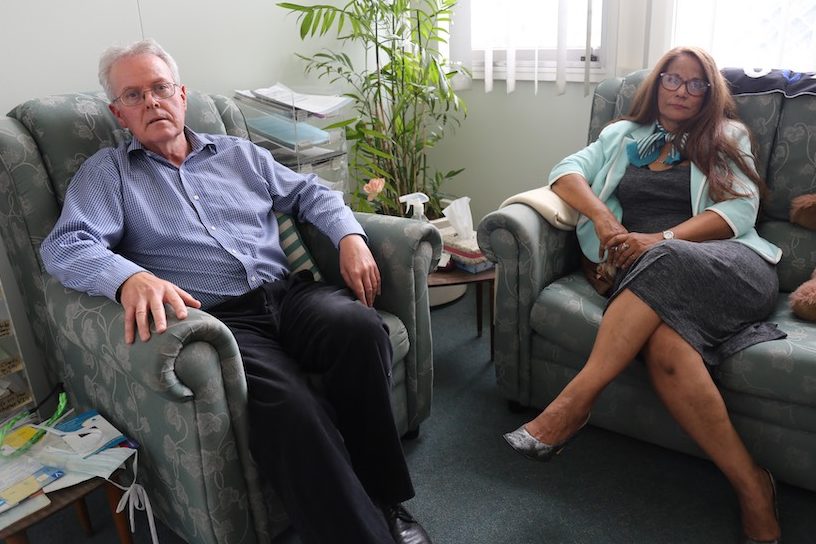
CANBERRA’S longest-existing victim support service that “runs on the smell of an oily rag” fears without any government funding it may close its doors.
The ACT’s Victims of Crime Assistance League (VOCAL) in Narrabundah is also crying out for volunteers amid a need for its services.
The organisation’s former co-ordinator Marie-noelle Cure, 68, is still the driving force behind the organisation, but has not been paid a cent since 2011 when the service’s government funding was scrapped.
Cure, a pensioner and the organisation’s only counsellor, said she needs more staff, reliable volunteers and funding to pay the bills.
“Every year we cry out for government assistance but they [ACT government] are hell-bent on not supporting us,” Cure said.
“We just want to help people because there is a need for our service.”
From the families of people murdered, to burgled business owners and rape victims, VOCAL has looked after victims of crime in Canberra since its creation 33 years ago, offering practical support to victims to deal with trauma and the onerous processes of court.
The group formed in 1988, in the living room of Bob and Rita Cameron’s Weston Creek home, not long after the couple’s 16-year-old son Grant was punched and kicked to death at the Duffy Primary School fete in 1987.
The emotional shock that enveloped Rita and Bob – a federal police constable – was shared by many other victims of crime in Canberra who had nowhere to go.
“And so VOCAL was born,” Cure said.
In the early days, VOCAL became a lobbying force to change laws and draw the attention of politicians and the judiciary to the rights of victims, Cure said.
“Offenders were getting all the legal support and help they needed and victims were treated as criminals in the legal system,” Cure said.
“VOCAL achieved a lot in terms of getting Canberra and the court system to recognise the needs of victims to have victim-impact statements and all of that.”
Moving to its Narrabundah headquarters in 1992, the service at its peak had a client list of 500, but in 2011 it lost a major contract to provide victim support services in the ACT.
The contract was given to a government agency, Victim Support ACT (VSACT), in an open-tender process that began when VOCAL applied to increase its funding past a threshold of $200,000.
The loss of funding significantly impacted the not-for-profit organisation, leaving it with a tight budget, skeleton staff and some volunteers.
Cure believes VOCAL was squeezed out of the victim-support sector intentionally.
“Once the government service started their aim was to become a one-stop shop and to be the only service in town and to do away with what they call a duplication of services,” she said.
“They [ACT government] are enamoured with this one-stop-shop approach and they have convinced the politicians that this service is better for victims because it saves them a lot of trouble; it doesn’t.”
Victim Support ACT now sits under the ACT Human Rights Commission.
The ACT Victims of Crime Commissioner, Heidi Yates, said the agency has helped 2159 victims of crime and 513 new clients in 2019-2020.
“The number of people VSACT has assisted has increased every year for the past four years,” Ms Yates said.
Volunteers provided 73 victims of crime with 310 hours of court support and 251 hours were provided for client-support projects.
More than $3.3 million was paid in financial assistance to victims of crime in 2019-20.
Cure is at pains to point out that VOCAL is not looking to compete against the government-run agency, but insists there is still a largely unmet “need” for a community based victim support service.
She said that despite the lack of financial assistance from the government, people are clearly still keen on using her organisation, with about 100 clients a year walking through the door.
Cure’s greatest hope is that a mutually beneficial partnership can be established where referrals to VOCAL are part of the solution to meeting demand for these services.
“The government offers a few hours of counselling, ta-ta goodbye, it doesn’t work. Our model of service is that we stay open and we see you whenever you need it, for as long as you need it, for the rest of your life.”
Bryan Harper, 66, is the chairperson of VOCAL, a committed volunteer and a fierce advocate for the service.
“We’d need around $200,000 a year to employ staff, pay the bills and stay afloat,” he said.
“We are running on the smell of an oily rag at the moment, apart from the odd donation, we are just hanging on.”
A Justice and Community Safety directorate spokesperson said the ACT government is “committed” to continuing to work in “partnership” with community agencies to support and improve services for victims of crime.
“Each year, the ACT conducts an annual community consultation process which allows individuals and organisations to give feedback on gaps in government funding,” the spokesperson said.
As for VOCAL’s headquarters, a homely yet ageing cottage near the Narrabundah shops: “We are happy here, office blocks are impersonal, we don’t need new furniture, I have a desk that was given to us by the government in 1988, it’s solid and it’s all I need,” said Cure.
And perhaps a handful of committed volunteers.
Prospective volunteers should visit vocalact.webs.com
Who can be trusted?
In a world of spin and confusion, there’s never been a more important time to support independent journalism in Canberra.
If you trust our work online and want to enforce the power of independent voices, I invite you to make a small contribution.
Every dollar of support is invested back into our journalism to help keep citynews.com.au strong and free.
Thank you,
Ian Meikle, editor





Leave a Reply